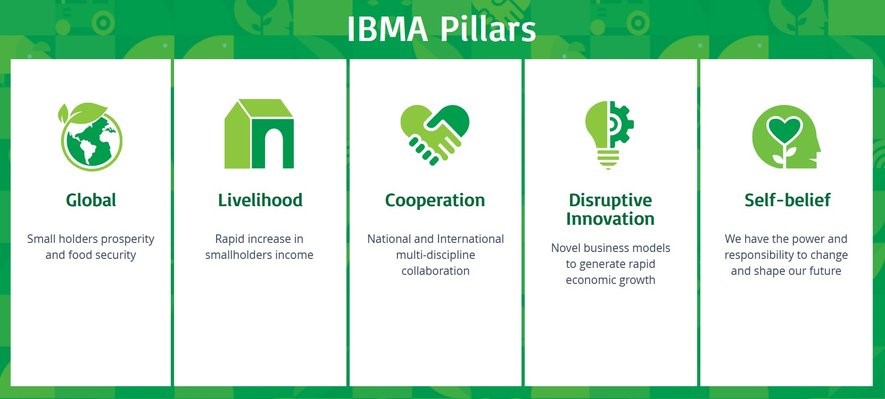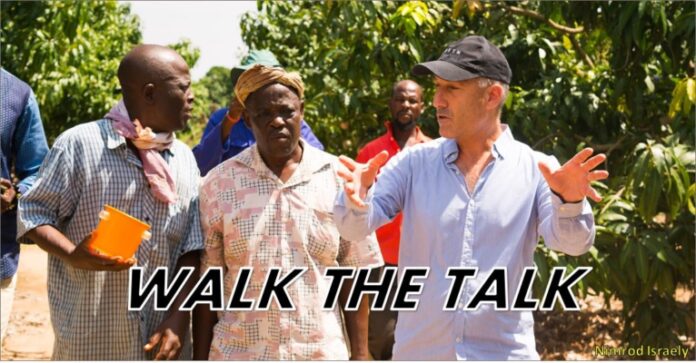“If everyone agrees with your ideas, they can’t be as radical as you think..”
By: Nimrod Israely – Founder and CEO at Biofeed Ltd
I dedicate this column to my fellow entrepreneurs who chose to step out of their comfort zone and turn words and dreams into actions to create better future realities.
I am sure it happened to you, too; you come across a post dealing with a global issue, such as global warming, pesticides, poverty, hunger, equality, etc., then you click a Like or even add some Comments and Share before continuing to the next post.
There seems to be a “common agreed good,” something like the Biblical Ten Commandments, which we all support by talking out loud on those issues.
Yet, how many of us “walk the talk” (not only “like” but acted)?
We expect people would do what they preach, but do they?
Here are two examples to demonstrate what I mean:
Oil industry – Do workers and managers in oil companies want to encourage global warming, hunger, poverty, death from natural disasters, etc.?
I am sure they don’t. Only a few days ago, at COP 27, the heads of the oil industry announced (again) their commitment and full and unreserved intentions to fight global warming to protect the environment and life on Earth. They promised!
Agrochemical industry: Are the employees and managers of agrochemical companies interested in poisoning the people, the soil, the air, the food, and the environment? Do they want to create food shortages and poverty?
I am sure they don’t. Only a few days ago, at COP 27, the heads of the agrochemical industry announced (again) their regenerative, eco-friendly, 100% health-safe approach toward future agriculture and food production methods. To judge by those companies’ websites, Earth is green, the skies are blue, and everybody is healthy with plenty of food and… smiles, many smiles. They promise to increase food production, keeping us safe, healthy, and prosperous while reducing water, land, and labor use.
Meanwhile, show time is over for the 27th time, and everybody is back to their routine. The oil industry is growing (“The market size of the Global Oil & Gas Exploration & Production industry is expected to increase 27.5% in 2022.“ source), and the agrochemical companies successfully increase their chemicals/pesticides sales.
Another example is the Israel Cohen” Institute for Biological Control. It should advance biological control (no need to read its Vision/Mission as its title advertise it). Still, it is responsible for more pesticide sprays in Israel than any other company or organization.
In all cases, I leave you to guess why they say one thing and act differently.
Wait, what’s going on here? Are they all liars, untrustworthy!?
I have met and worked with countless people in the agrochemical industry. They are good people like you and me, who genuinely mean and want what they say.
So how do you explain the above discrepancies?
Great question, as it reveals the gap between:
THE VISION – What I want to do.
THE VIRTUE – What I do.
Most people, organizations, and nations exist and act in the gap between VISION and VIRTUE.
The oil and agrochemical industry state a beautiful Vision, but their Virtues show their true face. Never judge a person or organization by their Vision or Mission statement, but by their actions.
What is the difference between them?
Most organizations have a “Vision” and a “Mission” that they drafted with or without an advisor. As you step into the manager’s office, you will see it framed on the wall. How impactful is their Vision on the individual/organization? Maybe a little, perhaps a lot; there is no way to know.
Virtue, on the other hand, is what they do, which impacts others and affects the organization’s culture and practices – hence its business results. Virtue, therefore, can be seen and measured in real life.
Think of great leaders who changed the world, e.g., Moses, M.L. King, Mother Teresa, J.F. Kennedy, George Washington, Gandhi, Einstein, and Steve Jobs. Do we remember them because of their Vision or thanks to what they did, their Virtues?
Those leaders “Walk the talk,” and we remember them for that, even thousands of years later.
Do oil and agrochemical companies have Visions/Missions? Sure they do. But what matters at the end of the day, what impacts their and our reality, are their Virtues.
Example from Vision/Mission statements:
British Petroleum – “Our ambition is to be a net-zero company by 2050 or sooner. And to help the world get to net-zero…”
Syngenta –“… healthy ecosystems and thriving rural communities…”.
Do you trust those statements? Do you believe they follow it?
What you do is who you are; Virtue is superior to the company’s Vision and Mission.
We expect entrepreneurs to keep their promises and walk the talk. We judge them by what they do rather than what they say.
That’s why it’s always challenging to be an entrepreneur.
I AM WHAT I DO
I grew up in a house with parents who had a straightforward approach to how and what you do; you say what you think and do what you say. In other words, there was never an option other than “walk the talk.”
I embraced that attitude, and my legs and whole body followed my heart and my spoken words wherever those led me.
I loved agriculture, so after high school, instead of joining the Israeli army as everybody does (in Israel, military service is mandatory), I postponed my service and volunteered to help farmers in a young Kibbutz (three years old) for one year. I walked the talk.
When I joined the army a year later, I believed in the need to serve my country and protect it, so I volunteered for one extra year. I walked the talk.
After that, I returned to my old love, agriculture. I walked the talk.
But then I noticed that “my love,” agriculture is toxic and poisonous to me as a farmer, to non-target organisms, to the environment, and may risk even the consumers who feed on what I grow. I met plenty of arrogance, ignorance, and misleading people and information leading to wrong decisions.
It took me time before I figured out that there is a dissonance between the self-image of other farmers and me (i.e., doing good to people and the environment) versus the actual results of our action as “chemical-oriented conventional farmers,” i.e., producing food at a costly “price” to people’s and the environmental health.
I said, “for sure, a different way must exist to practice more profitable agriculture, healthier, sustainable, and friendlier in a broad meaning.”
I didn’t live well with the dissonance between how I view myself and what I do. So I began developing alternative zero-spray crop protection solutions and went to university to learn so I could do things better. I walked the talk.
The one thing I knew about the solution I planned to develop was that it would not be like anything that exists, for the existing solutions are either – poisonous, ineffective, impractical, or a combination of those.
Equipped with 14 years of academic knowledge, I founded Biofeed, a company dedicated to MY VISION, developing novel zero-spray crop protection solutions.
Biofeed’s MISSION was to develop 21st-century effective crop protection solutions with zero environmental impact.
We started with the globally most notorious group of pests – fruit flies. Fruit flies often cause 30% to 80% of fruit and vegetable yield loss and are responsible for international export restrictions and limitations, and over time that causes 50% to 90% income loss.
It took 13 years for Biofeed to develop the Freedome, a crop protection zero-spray solution that reduces 99% of the sprays and 99% of yield loss (versus sprays).
In 2017 and 2018, Freedome became the first zero-spray solution to control the globally #1 fruit pest effectively, Bactrocera dorsalis, first in India and then in Africa. That pest, B. dorsalis, is responsible for $ multi-billion annual agriculture damage, causing extensive poverty.
Today Biofeed holds the most effective, zero-spray solutions to more fruit flies than any other company. I walked the talk.
African and Asian farmers that used it view the Freedome solution as a miracle and are thankful that it exists. They remained speechless after seeing its positive in-field impact.
However, although we achieved top professional results, the small-hold farmers, which constitute 97% of all farmers, could not reach Freedome due to its price.
When we provided Freedome free of cost, we discovered that small-hold farmers could not sell their higher-quality produce at premium markets and could not pay for the needed products.
Hence, their income remained low, and they remained in poverty with no hope for a better future (link).
It took time until I realized that even the best technology, when provided as a “stand-alone solution,” is not enough, regardless of how good and effective it is.
To create prosperity among small-hold farmers, I need a novel business model that combines the value chain of inputs to farmers with the value chain and the supply chain to premium markets.
That gave birth to the Dream Valley operational business model and later the foundation of a new company.
In 2021, working under the Dream Valley national-scale pilot and concept – Senegalese mango growers doubled their income, and Senegal doubled its national fresh mangos export to the EU, moving from 12 million to 24 million kg (an additional $12M national export).
We noticed (as we predicted based on previous projects) that Dream Valley farmers using the Freedome under the Fruit Fly Certified Trade Zone protocol didn’t need pesticide sprays or other chemicals during the 2021 mango export campaign.
The Dream Valley model enables all farmers, including small-hold farmers, to access state-of-the-art technologies and protocols to increase their yield and produce quality.
Then it provides them access to premium markets to increase their income per kg. Overall, farmers under Dream Valley increase the three most important parameters: yield, quality, and price per kg. The result is a total income increase of over 200%. I walked the talk.
The Dream Valley concept is business-oriented, one that is made to increase farmers’ income by a three-digit percent number (XXX%) and other stakeholders by two-digit percent (XX%).
It is so profitable that only blind investors wouldn’t like to join it once they understand its full scale and depth.
In other words, Dream Valley is designed to be a magnet, attracting investors, companies, and business people to invest in the agro-industry of underdeveloped economies thanks to the easiness and safety it provides. Contact me to join.
ENTREPRENEURS
We only get a few self-reflection opportunities during our busy routines and activities.
As I was writing this column, I could not avoid the pattern that emerged before me, outlining my own life.
I found a pattern of a naivety serial entrepreneur who wishes to improve many people’s lives.
An entrepreneur who avoids the sharp pebbles he walks on and the rocks through at him as if they never existed because the “great goal” makes those irrelevant, and he couldn’t do it any other way.
We live in the era of innovation, mostly Sustaining and Efficiency innovation, as defined by Professor Clayton Christensen from Harvard Business School (HBS).
Those two types of innovation created a fortune for some and more comfort for many. Still, they failed to significantly improve the lives of 2.2 billion people whose livelihood depends on agriculture, many living in poverty.
As discussed before, only one type of innovation can instantly change millions’ lives, and that is Disruptive Innovation.
An “innovation” becomes “disruptive” not because it is a technological breakthrough, e.g., the Freedome of Biofeed, but when it combines with a disruptive business model, e.g., Dream Valley operational model.
For that reason, you may view this column as a wake-up call, inviting those with the proper virtues who wish to walk the talk to remember that technology without an adequate business model is no more than “a cool staff.”
However, magic happens when we integrate the right technology into a disruptive business model; farmers double their income, and nations increase their export within a couple of months.
What you do is who you are.
Today, I am here, active in the agriculture business, to help you walk the talk the way you choose by developing a business model or joining a disruptive one.
Option 1: Develop and introduce your own business model – attend the International Conference On Business Models In Agriculture (IBMA), March 27-29, 2023, in Kigali, Rwanda.
If you have a great story about a successful or unsuccessful business model you were involved in, this is the place to present and share. You can still apply as a speaker (last available slots).
Unlike many conferences, the IBMA conference is designed to enhance and accelerate agro-business; you participate so you can (a) accelerate your business, (b) help others to accelerate their business, or (c) join others in doing so.
To that end, the IBMA conference invites people of good virtues, holding high-level positions and ready to walk the talk to attend.
This includes CEO, business model experts, decision-makers, leaders, investors, agrotech managers, business development personnel, business schools, and others who have the burning desire to transform their Vision into reality. We want you at the IBMA conference. Contact me (nisraely@biofeed.co.il) if you need more information.
As the conference chairman, I invite you to contact me if you are unsure if it is for you, if you wish to present, or provide IBMA with your sponsorship.
 Option 2: Join us at Dream Valley, do it in the frame of an existing disruptive business model dedicated to improving farmers’ lives by accelerating the trading of high-added value crops, e.g., mangos and avocados, from low-cost production regions to high-price premium markets, e.g., mango export from Senegal to the EU.
Option 2: Join us at Dream Valley, do it in the frame of an existing disruptive business model dedicated to improving farmers’ lives by accelerating the trading of high-added value crops, e.g., mangos and avocados, from low-cost production regions to high-price premium markets, e.g., mango export from Senegal to the EU.
Dream Valley intends to create production hubs in Africa, Asia, and LATAM to advance its international export-import activities.
Dream Valley is looking and excited to have in its ranks those with passion, readiness, and virtues ready to invest in stepping it forward.
Also, contact me if you wish to become a business partner or a client, e.g., businesspeople, agro-tech companies, agro-industry stakeholders, leaders, decision-makers, and government officials.








